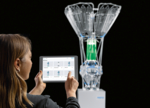
Valuable materials of all kinds - produced automatically in living cells
In future, algae could be used to produce practically everything that still requires petroleum, including plastics, fuels, medicines and food. Algae are also climate savers par excellence, because they bind ten times more CO2 than terrestrial plants. Festo, a company based in Esslingen, Germany, has developed a high-tech bioreactor that can be used to automatically cultivate the small green biofactories - and that do so a hundred times more…
https://www.biooekonomie-bw.de/en/articles/news/valuable-materials-all-kinds-produced-automatically-living-cells